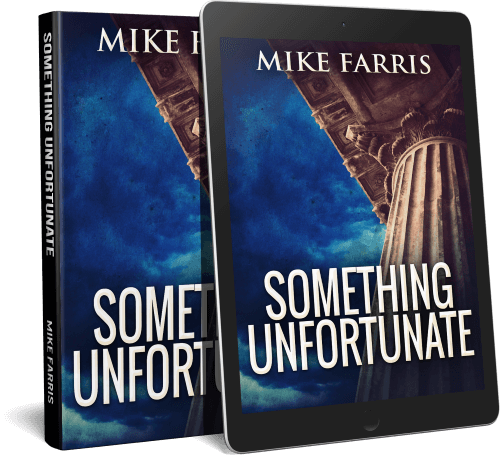The Paletti Notebook
The Paletti Notebook - book excerpt
Most of the lamps and torches in the narrow hallways of the monastery had been extinguished by the time Pietro Paletti made his way toward his cell on the second floor. Head bowed, hands folded at the rope belt around his waist, he padded softly across the stone tiles to the small chamber he had been assigned by Abbot Cisone upon his recent arrival at San Marco.
It was late in the evening and the few lamps still burning left only a disquieting semi-darkness in the hallways and small chapels along his path. At the monastery, night prayers – compline – had just ended and the monks were retreating to their private quarters to pray in silence and beg forgiveness for past sins and forbearance for future weaknesses.
Pietro reached his cell, gently swung the wooden door closed, and fell to his knees beside the rope and canvas cot. He addressed his Lord and tried to focus on his confessions, but he was also conscious of every sound beyond the door of his chamber. He had found no peace since coming to San Marco, whether on his knees or curled beneath the thin blanket on his cot. He had not mastered the monk’s habit of praying in silence, and as he murmured his entreaty to God, he occasionally silenced his voice to focus on a creak or murmur in the corridor.
Instead of a being absorbed in a communion with the Lord, Pietro’s mind kept coming back to his sins and the real reason he found himself in a cold cell in San Marco instead of walking the streets of Florence as a free man, as he had done so recently. Flashes of memory interrupted his concentration – a knife, the furious look on the face of a man engaged in hand-to-hand battle, the shrieks of a woman standing nearby, and the red sticky blood that dripped onto the sidewalk.
Pietro’s sub-conscious had dimmed a clear memory of that evening, but the mind that played this trick on him had more deception in store: While hiding the actual retelling of the murder, it still disturbed him with a series of ghostly images of the fight that he had instigated.
“He’s not serious about marriage,” Pietro had thought of Luca, his rival for the attentions of Isabella, a beautiful daughter of a rich merchant. Pietro had wooed the woman for months with serious intentions, only to see Luca step in with ungentlemanly promises that turned Isabella’s head and brought the blood into her cheeks.
“But I won’t let Isabella fall under the spell of his charms,” he muttered. And yet, he feared that Luca’s methods might still seduce the woman and cause her to foreswear the oath she had made to Pietro.
“A woman’s pleasure,” Pietro muttered in his prayer. He knew that a visual image of his lost love was a sinful diversion from his meditation as a novice monk, but he was too recently a man of the city and had not yet shed his worldly desires. Luca might win the woman over and take her to his bed, and Pietro knew he had to do something. He had to stop him. So, on a dark night weeks before, using a long knife stolen from the kitchen of his father’s restaurant, Pietro had gutted Luca like a pig. Right in the street. Right in front of Isabella.
Her primal screams at first sounded like a gleeful spectator’s approval, and so Pietro pushed the knife in farther, spilling the man’s blood on the stone tiles of the street and yanking the cord of his intestines out after it. But when the deed had been done, Pietro had a moment to consider his action and, suddenly, Isabella’s cries sounded different to his ears – more plaintive, more terrified.
He turned toward the woman he loved and saw her face twisted in horror at what she had seen. He saw her eyes bulging from their sockets, tears fully wetting her cheeks, and her mouth gaping open as if in the midst of some silent, voiceless scream.
Isabella met Pietro’s eyes and looked at him as if not comprehending what had happened. It didn’t come from her love of Luca; no, it emerged from a deep terror in her soul, an unfathomable horror that life and death could meet so quickly, exchange their destiny in a single moment, and then move on.
She ran from the scene, which was fine with Pietro at first.
Once Isabella was gone, he looked at the knife in his hand, the bloody stones at his feet, and the once-was-man lying prostrate on the street. He had ended Luca’s life – with cause, he was sure, but only by his own measure – and now he would face the consequences of judgment by someone else’s measure.
The knife simply slipped from his hand as if Pietro was willing it away from him. He turned north onto the street beside the piazza and began walking, then running in the direction of the monastery of San Marco. He had no plan and hadn’t considered what he would do if this deed came to pass, but he knew one thing.
If he was caught, he would be hung from the Palazzo Vecchio as a murderer.
Better to retreat to the monastery, confess his sins, and take the vows of a monk. Then he stopped and turned suddenly as he remembered a moral obligation, a family edict, a directive from his long-dead grandfather, Sandro. He bolted back toward the restaurant on the Piazza Gran Duca that his family had run for four generations, dashed into the back room where simple tools of the trade were kept, and retrieved a leather-bound satchel. He tucked it under his arm and then resumed his flight toward the monastery.
That was weeks ago. Every night he feared that his guilt would be recalled and he would face judgment. Not yesterday, tonight, or tomorrow. But any night.
And, as he did each night since, he prayed, consumed by guilt. Tonight would be no exception.
He knelt beside his cot, praying to God to forgive his sins, preparing himself for what he already knew would be another sleepless night. He had only recently taken his vows as a novice and was still plagued with anxiety about his actions in confronting the man flirting with Isabella. She had promised herself to him, Pietro, when he was still a free man in Florence. But the smiles and laughter she shared with Luca enraged him, and the soft touch of her fingers on Luca’s arm angered Pietro. So he had taken his revenge on the man and the woman.
Now, on this night as over the weeks in San Marco, every rasp or tap that echoed in the darkened cells of the monastery sounded like whispers of his impending judgment, punishment for murdering his rival in the streets of Florence. Isabella’s screams when the broad blade of the knife sank into Luca’s belly still haunted Pietro in every moment – during prayers, meals, and especially when he was alone.
It was quiet in the monastery. The monks had all returned to their cells to engage in their own communication with the Lord. No sound came from the hallway; if any did, it wasn’t anticipated or planned.
His ears were primed and caught every creak of timbers or whistle of a breeze. Suddenly, there was a sound that was out of place. A faint sound of leather shoes sliding across stone steps outside his cell seemed to be coming closer. Pietro lifted his head from prayer and held his breath, trying to discern where the sound was coming from. A soft pad of leather on stone, then another, and he heard the breath of someone outside the wooden door to his room. Pietro’s eyes went wide and his ears were alert, but then there was nothing – for a moment.
A subtle squeak of the hinges sounded as the door opened. Pietro turned his head away from his folded hands and to the opening at the doorway, where he saw a tall figure. It was hooded like so many of the monks with whom he lived, but the face was in darkness. There was only the dim light of the hallway candles coming from behind casting an eerie aura around the man.
With a sudden swift movement, the hooded figure moved forward, raised a long knife above his head and brought it down swiftly on the back of the kneeling Pietro. The novice monk’s face displayed both guilt and resignation; even in youth he seemed tired of life. The assailant’s knife penetrated the monk’s robes and went directly into the center of his back as brilliant red blood spurted out and Pietro slumped to the stone floor.
The hooded man finished the job by grabbing Pietro’s hair, yanking his head upward, and pulling the knife blade across his neck from ear to ear.
The intruder then pushed the limp body aside. Without pausing, he turned his attention to the floor of the cell, peering intently at the tiles at his feet as if he already knew where to look. He turned the knife point to the mortared edge of the stones in the floor of the cell. Scraping and digging, he wedged the blade beneath a stone and pried it up. There he found a leather satchel which the intruder lifted out from its hiding place. He quickly glanced at the contents, then closed the straps once again around the satchel and returned the stone to its original position over the now empty cavity in the floor.
The intruder withdrew a piece of parchment from his cloak and slipped it into the robes of the dead monk at his feet. It read “Ego sum ira Dei,” – “I am the wrath of God.”
Tucking the folder under his arm, the hooded intruder stepped quietly through the portal, pulling the wooden door closed and hastening from the monastery with his treasure.
Pietro, novice monk, recent murderer, pursuer of the elegant lady Isabella, and grandson of Sandro Paletti, was dead. And the treasure that his grandfather had given him on his deathbed in 1546 was gone.















Praesent id libero id metus varius consectetur ac eget diam. Nulla felis nunc, consequat laoreet lacus id.